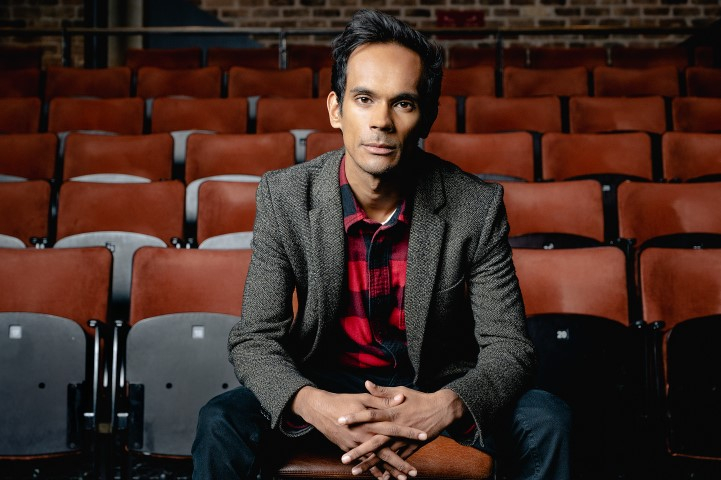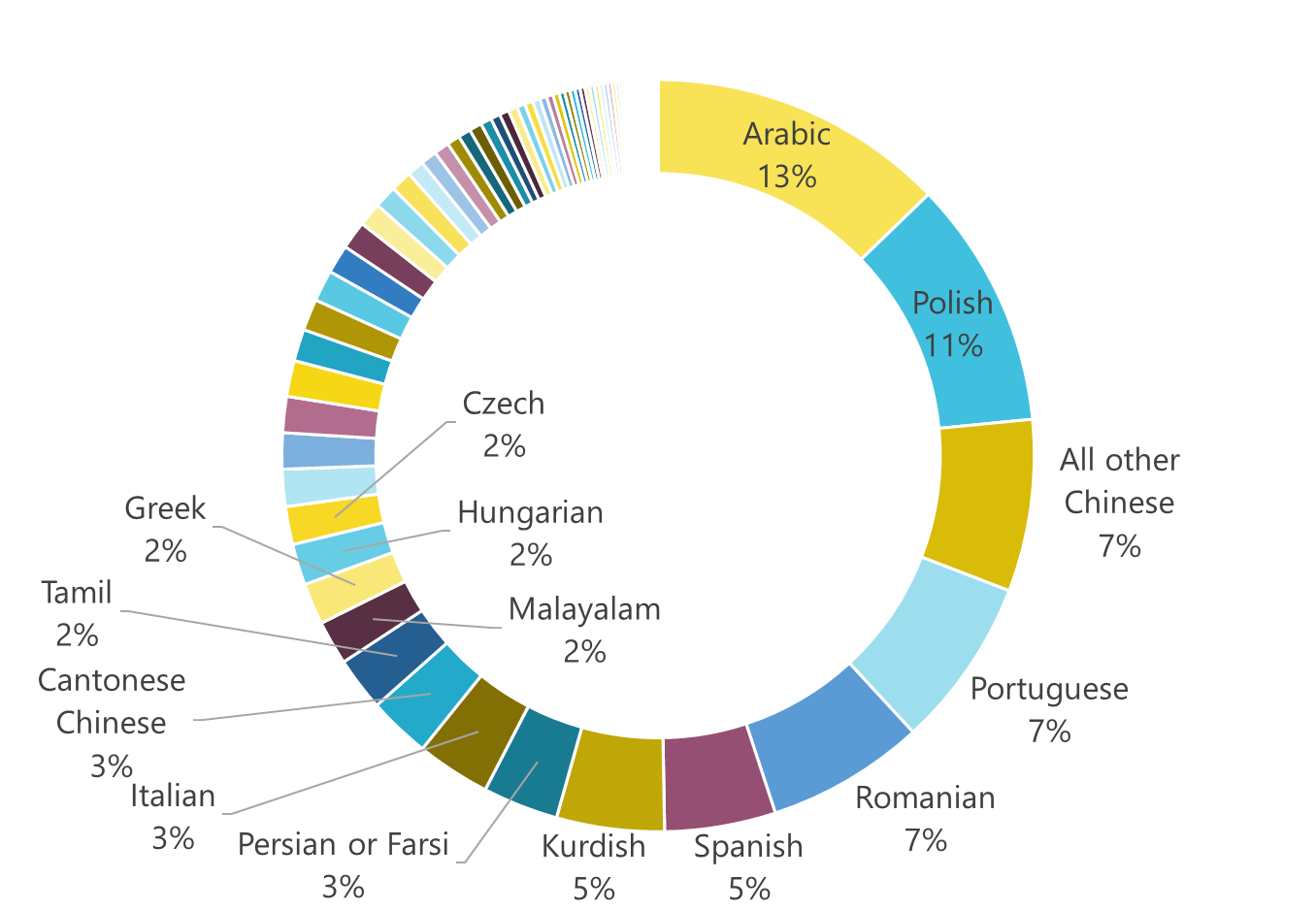Lingua Liverpudlia: A deep dive into Liverpool’s most spoken languages

Plus: ‘A mind-boggling nightmare’: Everton’s Moshiri bows out in shame
Dear readers — welcome to this week’s Post briefing.
Our big Everyman piece, about the premature departure of Suba Das as creative director, was one of our most popular reads of the year. 30 new paying members joined us that day and we’ve since had lots of emails and messages about it. We’re planning a follow-up story this week, so if you have information about what’s been going on at the Everyman and Playhouse theatres, or some context that will help your fellow Post readers to understand this story better, please do get in touch with Abi ASAP.
If you’re one of those new members, pull up a chair and make yourself at home; we’ve got a great edition in store featuring today’s big story, which asks ‘just how multilingual is Liverpool?’, England’s most resilient artist and a Tory minister hiding in a cupboard.
🚨 Hiring alert: You now have less than a week left to apply to become our new staff writer at The Post. We want to hear from amazing journalists from across the region by 24 September (that’s Sunday) — including people from diverse backgrounds who might not think they have the connections or confidence to secure a role in this industry. Finding that person — young or old, experienced or new to the game — is our number one priority at the moment, and we would be extremely grateful for any help in tracking them down. Click here to apply. The company we are part of, Mill Media Co, is also hiring two senior positions in Manchester — one editorial and one commercial. Find out more about the roles here.
If you didn’t catch the Everyman piece the first time around, it’s here. When Das arrived in town as the theatre’s new creative director last year, Andrea Nixon, the chair of Liverpool and Merseyside Theatres Trust, tipped him to “create and deliver a bold and inspiring new future.” At the time, Das wasn’t short of bold words himself, pledging to “find our responses to the ever-starker truths of climate crisis, gender violence, transphobia, structural racism and so much more.” But as we found out, things went pretty south, pretty quickly. “Persistent, careful and judicious reporting,” was the appraisal of one Post reader.

Editor’s note: Coming up at the weekend we’ll be publishing one of our biggest investigations in a while. We can’t give away too many details, but it’s the sort of project that takes a lot of time and resources, involves speaking to dozens of sources and making everything stand up legally. If you want to support us to continue to do that kind of work, and give Liverpool a type of journalism that doesn’t just involve breathlessly rewriting press releases for local organisations, then do consider a subscription. We think Liverpool deserves better, and for £7 a month, you can help us to do that.
This week’s weather
Tuesday 🌧️ Light rain and a gusty winds with highs of 16°C
Wednesday 🌧️ Thundery showers and a moderate breeze with highs of 19°C
Thursday 🌧️ Light rain and a gentle moderate with highs of 17°C
Friday 🌦️ Light rain showers and a moderate breeze with highs of 17°C
Weekend 🌦️ Light rain showers and a moderate breeze with highs of 17°C
This week’s weather forecast is sourced from BBC Weather and it’s for Liverpool.
Open Newsroom
- We’re keen to hear from anyone who has worked for, or has any knowledge of, Jacaranda Records. If that’s you, email Jack.
- We’re writing about antisocial behaviour in Garston, specifically under the bridge and around the now derelict village hall. Email Abi if you have any information for this one.
The big story: Lingua Liverpudlia
Top line: Data released from the 2021 census revealed the true extent of the languages spoken in Liverpool. While 90% of the city’s population have English as their first language, there’s a huge degree of variation among the remaining 10%. We’ve been doing some analysis.
Arabic and Polish are the two biggest hitters, as the main languages of roughly 1% of the city’s population, with a top ten that also features languages as varied as Portuguese, Kurdish, and Cantonese. In total, there are 87 different languages that people count as their first, with a smattering of speakers of Luganda, Korean, and Danish.
The main languages of the 10% of Liverpool’s non-native English speakers

The city’s historic connections with the other home nations are apparent from its linguistic mix. Liverpool has the largest population of first-language Welsh speakers in England, justifying the “capital of North Wales” tag it sometimes gets. There’s a Liverpool Welsh Society holding weekly language classes, and even a Welsh Choral society. We’re also host to England’s biggest primarily Irish Gaelic-speaking community (though it does consist of just 35 members).
Liverpool’s history and international connections give it a different profile to Manchester, where Urdu is the second most spoken language (in Liverpool, Urdu ranks 17th). But Liverpool has roughly twice as many Tamil speakers as Manchester. Liverpool also hosts the North West’s biggest Portuguese-speaking population.
For those seeking to learn English, it’s an uphill struggle. English does share some common ground with Latin languages, especially French; many French or Latinate words were introduced into England following the Norman conquest. (One measure, “lexical similarity”, puts the relationship between French and English as 0.27, where 1 = complete overlap, and 0 = no overlap.) But with languages like Arabic and Farsi there is virtually no connection. Polish is slightly closer, but still originates from a different family of languages (Slavic).
Despite that, three-quarters of those in Liverpool without English as a main language describe themselves as being able to speak English “well” or “very well”. Only 4% say they cannot speak English at all.

Those languages that are much closer to English — Western Germanic languages like Dutch, and Northern Germanic languages like Swedish — have a much smaller presence in the city. Nevertheless, they’ve had an impact in Liverpool over time — in fact, “scouse” is believed to relate to the Norwegian lapskaus, Swedish lapskojs, and Danish labskovs — all describing a hearty stew popular with sailors.
The picture differs across various parts of Merseyside; in Sefton, Knowsley, St. Helens, and Halton, less than 5% of the population are non-native English speakers, whereas in Wirral, it’s only 2%. In all of these districts, Polish is the second most spoken language — as is true for the UK as a whole.
Our take: The breadth of languages in Liverpool reflects its history as an internationally-facing port city that has accepted waves of immigration over hundreds of years. While English is increasingly the lingua franca in much of the world, other languages can help us to express ourselves, and even see the world in different ways. Such linguistic variety is to be welcomed.
Your Post briefing
Lucy Letby is set to appeal all of her murder convictions after being sentenced to life imprisonment last month. Letby was found guilty of killing seven babies by injecting them with air and insulin at the Countess of Chester Hospital between 2015 and 2016, and a further six counts of attempted murder. Another court hearing, however, on 25 September is set to decide whether a retrial will take place over those additional six counts. An inquiry into her time at the Liverpool Women’s Hospital is also ongoing, with Letby’s legal team now filing an application for permission to appeal her convictions, according to the Court of Appeal Criminal Division.
Former prime minister Theresa May has claimed that one Tory minister "hid in a cupboard" to avoid meeting the families of the 1989 Hillsborough disaster during her time as home secretary. In an interview with BBC Radio Merseyside, May refused to name the minister but said "it exemplified a sense" of the attitude of some of her colleagues in the Conservative Party. “[Some of my colleagues] thought it happened so long ago there's no point in revisiting it, some thought it had happened under a Conservative government — why should another Conservative government open this door?" she told the BBC, adding that she was always conscious that she would have to work hard to gain the trust of families and survivors of the tragedy due to her status as a Conservative politician.
If at first you don’t succeed, give it another nine cracks at least. Graham Crowley — Suffolk’s most determined artist — has won the biennial John Moores Painting Prize with his 10th attempt. Crowley has entered the competition, hosted by Liverpool's Walker Art Gallery, intermittently since 1976, but hasn’t been successful until now. This time, that changed. He beat 3,357 fellow artists with Light Industry, a piece “inspired” by a visit to a motorcycle dealership; “What I found enthralling about the place was the light; a diffused, dusty kind of light that emanated from a grubby, obscured skylight,” he said.
Home of the week

This two bedroom first floor apartment is on the market for £210,000. Located in Formby, the property has a garage and car parking space, plus beautifully kept communal gardens. Find out more here.
Post Picks
🍁 Learn how to reconnect with nature with author Julia Bradbury, who will be interviewed by BBC journalist Louise Minchin at Birkenhead School on Wednesday. Bradbury tells all about the power of staying active outdoors in support of her new self-help book, Walk Yourself Happy. Find out more here.
🎸 Indie pop’s rising stars Lovejoy head to The Guild on Saturday after the roaring success of their debut EPs Are You Alright? and Pebble Brain. Doors open at 7pm — get your tickets here.
📺 Join Tony Schumacher, creator of BBC1's The Responder, for a live interview and audience Q&A at Sefton Park Palm House on Thursday. Find out more here.
🎹 Boston-based shoegazers Horse Jumper of Love headline the Kazimier Stockroom this Friday courtesy of promoter Pink Dot. The event starts at 7pm — find out more here.
Our favourite reads
Alan Bleasdale might not see the upcoming stage adaptation of his iconic Boys from the Blackstuff, but he’s still emotional about it. The 1982 drama, following a group of Liverpudlian road layers struggling in the midst of mass unemployment in the UK, is coming to the Royal Court, having been adapted by James Graham (writer of Sherwood: another TV drama that engaged with working-class struggles of its era). Bleasdale now suffers from age-related macular degeneration, impairing his eyesight, so he says he’ll have to settle for the radio version of Graham’s play. Nonetheless, he’s excited. “When I read the scripts. I realised James had seen things about the city that I hadn’t. And it’s because I live here,” he told the Guardian.
“It’s a given that when a bad news story surfaces in the media, a stream of crass commentary soon follows,” writes the New Statesman, “reducing a terrible situation to just another excuse for attention.” Has the coverage of Lucy Letby — recently convicted for murdering seven babies — been another case of this galling cynicism? Sarah Manavis claims that much of the recent press coverage has felt eerily similar to the sort that emerged from amateur sleuths following the death of Nicola Bulley back in January. Have a read.
As Farhad Moshiri plans his exit from Everton FC (American firm 777 Partners is in talks to buy out his shareholding) the BBC sums up his tenure in no uncertain terms: “chaos, waste and dysfunction”. His time as owner has featured bizarre managerial choices, claims that a “voodoo message” convinced star player Romelu Lukaku to leave the club in 2017, lingering uncertainty over the exact role played by sanctioned Russian oligarch Alisher Usmanov, and last season’s descent into madness when protests led to the club’s chief executive being put in a headlock by a fan. The results were awful too, which meant Everton narrowly avoiding relegation in the last two seasons. Not the most gushing of assessments, but probably not unfair.
Letters from readers
Seems a pity more of a compromise couldn’t have been achieved — the line from Richman about ensuring an artistic vision having its challenges seems to hit the point. I can see why a young man trying to make his mark in a place would want to try and shake things up, but a little give and take and he might’ve been able to earn more time, ‘The Everyman hired a young director with a big reputation. A year later, he's gone’, Robin Mulvihill
Although I'm a Pink Floyd and heavy rock fan I also liked Marc Bolan. In 1972 my late wife and I saw T Rex, at the old Liverpool Stadium, and it was just pandemonium! I've been to countless concerts but this was the only one where I've seen young girls become completely hysterical, ‘Death of the 20th Century Boy’, Bill Watson
Correction: An earlier edition of this article misquoted an article in the New Statesman talking about the press coverage of the Lucy Letby murders. We wrote that the New Statesman article had said the Daily Mail’s Letby podcast was made without the input of “real” journalists, whereas it was actually refferring to a documentary made by the Cheshire Police department. We apologise for the error.


Comments
Latest
Michael Heseltine 'saved' Liverpool. Didn't he?
Cheers to 2025
Searching for enlightenment in Skelmersdale
I’m calling a truce. It’s time to stop the flouncing
Lingua Liverpudlia: A deep dive into Liverpool’s most spoken languages
Plus: ‘A mind-boggling nightmare’: Everton’s Moshiri bows out in shame